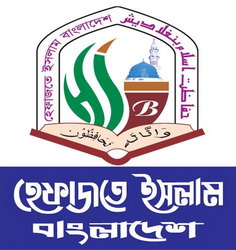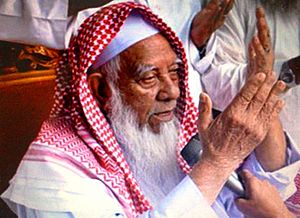Hefazat-e-Islam Bangladesh facts for kids

The logo of Hefazat-e-Islam Bangladesh
|
|
| Abbreviation | HIB Hefazat |
|---|---|
| Formation | January 2010 |
| Founders | Shah Ahmad Shafi Junaid Babunagari Izharul Islam Chowdhury Abdul Malek Halim |
| Type | Islamist advocacy group |
| Headquarters | Al-Jamiatul Islamiah Azizul Uloom Babunagar, Hathazari Chittagong, Bangladesh |
|
Region served
|
Bangladesh |
|
Official language
|
Bengali |
| Muhibbullah Babunagari | |
|
Secretary General
|
Sajidur Rahman |
|
Joint Secretary-General
|
Mamunul Haque |
Hefazat-e-Islam Bangladesh (Bengali: হেফাজতে ইসলাম বাংলাদেশ, lit. 'Protection of Islam, Bangladesh') is a group in Bangladesh. It is made up mostly of religious teachers and students from Islamic schools called qawmi madrasas. The group works to promote Islamic ideas and values in the country. In 2013, they presented a list of 13 demands to the government of Bangladesh. One of their main requests was for a law against insulting Islam. In recent years, Hefazat has become more moderate and has worked against terrorism. This is partly because the Awami League government has helped create jobs and supported the qawmi madrasas.
Contents
History of Hefazat-e-Islam
Hefazat-e-Islam was started in 2010. It began as a group of teachers from several Islamic schools in Chittagong, Bangladesh. Important founders include Shah Ahmad Shafi, Allama Junaid Babunagari, Mufti Izharul Islam, and Abdul Malek Halim. The group was formed partly because of a government plan in 2009 about women's development.
In February 2010, Hefazat wanted to hold a protest in Chittagong. They were protesting against government plans that they felt would harm religious politics and madrasah education. Police did not allow their rally, and some protesters were injured. Later, in 2011, Hefazat-e-Islam also protested parts of a proposed policy for women's development.
Key Demands and Protests in 2013
In 2013, Hefazat-e-Islam became more active. This happened after some people involved in the 2013 Shahbag protests were accused of posting disrespectful content about the Islamic prophet Muhammad online. Hefazat organized a large rally in Dhaka, the capital city. They asked for strict punishment for those who insulted Islam and for a law against blasphemy. They put their requests into 13 main points:
- They wanted the phrase "Complete faith and trust in the Almighty Allah" to be put back into the country's constitution.
- They asked for a law that would give strict punishment to prevent insulting Islam.
- They wanted strong action against people who made disrespectful comments about Muhammad and Islam. They also wanted to stop the spread of such messages.
- They asked to stop the spread of "foreign cultures" that they saw as harmful. They wanted to encourage women to wear hijab and ensure their safety. They also wanted to stop anti-social activities and violence against women.
- They wanted Islamic education to be required from primary school to higher secondary levels. They also wanted to change the women's policy and education policy that they felt were against religious values.
- They asked for a specific religious group to be officially recognized in a certain way.
- They wanted to stop the building of sculptures in public places like intersections and schools.
- They asked for no restrictions on prayers for religious scholars in mosques, including the Baitul Mukarram National Mosque.
- They wanted to stop anti-Islamic content in the media.
- They asked to stop anti-Islam activities by non-governmental organizations (NGOs) in the country.
- They wanted to stop harm to religious scholars.
- They asked to stop bothering teachers and students of qawmi madrasas and religious scholars.
- They demanded freedom for all arrested religious scholars and madrasah students. They also wanted all legal cases against them to be dropped.
Large March in April 2013
On April 6, 2013, Hefazat-e-Islam organized a large march towards the Motijheel area in Dhaka. People came from Chittagong, Sylhet, and Rajshahi to support their 13 demands. Some media called this event the "Siege of Dhaka." During the march, there were clashes between Hefazat supporters and other groups. Some people were injured, including journalists.
Protests in May 2013
On May 5, 2013, Hefazat held another rally in Dhaka to push for their demands. On May 4, Hefazat activists gathered at the entrances to Dhaka, creating a blockade. On May 5, they entered Dhaka and moved towards the Baitul Mukarram National Mosque. There were clashes with activists from the ruling Awami League party. Hefazat supporters also threw bricks. Later, security forces, including police and other groups, launched an operation to clear the protesters from Dhaka.
Lawsuits Against Hefazat-e-Islam
The government filed several legal cases against top leaders of Hefazat-e-Islam. These cases were for various charges related to the protests. In 2014, a case was filed with the International Criminal Court against some Bangladeshi officials.
Secularism Lawsuit
In 2016, some activists asked a court to remove Islam as the official state religion of Bangladesh. They argued that the first constitution of Bangladesh in 1972 was secular. Islam was made the state religion in 1988. Hefazat-e-Islam said they would strongly protest if Islam was no longer the state religion. The court later rejected the petition. A lawyer for Hefazat said that having Islam as the state religion did not harm minority religions.
Lady Justice Statue Controversy
In 2017, Hefazat-e-Islam supporters protested against a statue of the Greek goddess of justice placed at the Bangladesh Supreme Court. They believed it was a plan to weaken Islam in Bangladesh. Hefazat-e-Islam asked the Supreme Court to remove the statue.
2021 Anti-Modi Protests
In March 2021, Hefazat-e-Islam protested the visit of Narendra Modi, the Prime Minister of India, to Bangladesh. They accused Modi of being anti-Muslim.
Protests from March 26-28, 2021
After Narendra Modi arrived on March 26, Hefazat-e-Islam supporters gathered at Baitul Mukarram National Mosque in Dhaka after Friday prayers. Clashes started when supporters of the Awami League tried to stop the protesters. Police used tear gas and rubber bullets to break up the protests. The violence then spread to other parts of the country. In Hathazari, Chittagong, students protested, and there were clashes with police. To control the spread of news, the government blocked Facebook for a period.
Protests continued on Saturday, March 27, in Dhaka and other areas like Brahmanbaria. Hefazat supporters attacked trains and government offices. Facebook and its messaging app remained blocked.
Ideology of Hefazat-e-Islam
Hefazat-e-Islam started as a group with very strict Islamic views. However, it has gradually moved towards more moderate Islamic ideas. This shift happened as the Awami League government recognized degrees from qawmi madrasas and worked to unite against radical groups. The group has also asked the government to cancel a commission that was set up to protect and promote women's rights and freedom.
See also
- List of Deobandi organisations
- 2020 Hefazat Delegate Conference
- 2020 sculpture controversy in Bangladesh
- 2025 Hefazat Grand Rally
 | James Van Der Zee |
 | Alma Thomas |
 | Ellis Wilson |
 | Margaret Taylor-Burroughs |


